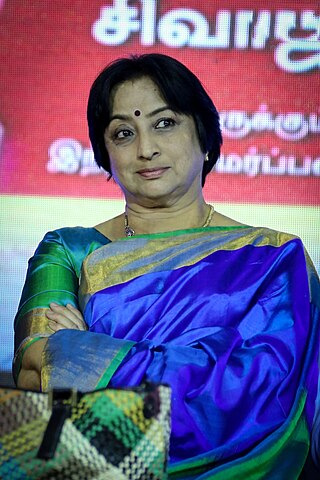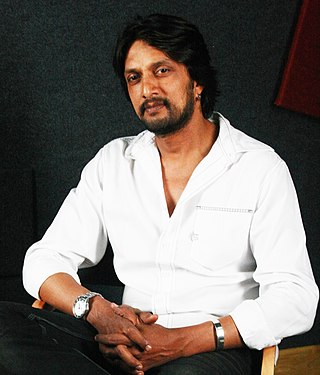
Kannada, formerly also known as Canarese, is a classical Dravidian language spoken predominantly by the people of Karnataka in southwestern India, with minorities in all neighbouring states. It has around 44 million native speakers, and is additionally a second or third language for around 15 million non-native speakers in Karnataka. The official and administrative language of the state of Karnataka, it also has scheduled status in India and has been included among the country's designated classical languages.

The Kannada script is an abugida of the Brahmic family, used to write Kannada, one of the Dravidian languages of South India especially in the state of Karnataka. It is one of the official scripts of the Indian Republic. Kannada script is also widely used for writing Sanskrit texts in Karnataka. Several minor languages, such as Tulu, Konkani, Kodava, Beary and Sanketi also use alphabets based on the Kannada script. The Kannada and Telugu scripts share very high mutual intellegibility with each other, and are often considered to be regional variants of single script. Other scripts similar to Kannada script are Sinhala script, and Old Peguan script (used in Burma).

Singanalluru Puttaswamaiah Muthuraj, better known by his stage name Dr. Rajkumar, was an Indian actor and singer who worked in Kannada cinema. Regarded as one of the greatest and versatile actors in the history of Indian cinema, he is considered a cultural icon and holds a matinée idol status in the Kannada diaspora, among whom he is popularly called as Nata Saarvabhouma, Bangarada Manushya, Vara Nata, Gaana Gandharva, Rasikara Raja, Kannada Kanteerava and Rajanna/Annavru. He was honoured with Padma Bhushan in 1983 and Dadasaheb Phalke Award in 1995. He is the only lead actor to win National Award for Playback singing. His 39 movies have been remade 63 times in 9 languages by 34 actors making him the first actor whose movies were remade more than fifty times and the first actor whose movies were remade in nine languages. He was the first actor in India to enact a role which was based on James Bond in a full-fledged manner. The success of his movie Jedara Bale is credited to have widely inspired a Desi bond genre in other Indian film industries. On the occasion of the "Centenary of Indian Cinema" in April 2013, Forbes included his performance in Bangaarada Manushya on its list of "25 Greatest Acting Performances of Indian Cinema". Upon his death, The New York Times had described him as one of India's most popular movie stars.

Kannada cinema, also known as Sandalwood, or Chandanavana, is the segment of Indian cinema dedicated to the production of motion pictures in the Kannada language widely spoken in the state of Karnataka. Kannada cinema is based in Gandhi Nagar, Bengaluru. The 1934 film Sati Sulochana directed by Y. V. Rao was the first talkie film released in the Kannada language. It was also the first film starring Subbaiah Naidu and Tripuramba, and the first screened in the erstwhile Mysore Kingdom. It was produced by Chamanlal Doongaji, who in 1932 founded South India Movietone in Bengaluru.
Kannada (ಕನ್ನಡ) is the language spoken in Karnataka. Karnataka has eight Jnanapeeth award winners, the highest honor bestowed for Indian literature. From the period of Adikavi Pampa(ಆದಿಕವಿ ಪಂಪ) who proclaimed his wish to be reborn as a little bee in the land of Kannada, Kannada poetry has come a long way to Kuvempu (ಕುವೆಂಪು) and Dattatreya Ramachandra Bendre

Kuppalli Venkatappa Puttappa, popularly known by his pen name Kuvempu, was an Indian poet, playwright, novelist and critic. He is widely regarded as the greatest Kannada poet of the 20th century. He was the first Kannada writer to receive the Jnanpith Award.

Girish Karnad was an Indian actor, film director, Kannada writer, playwright and a Jnanpith awardee, who predominantly worked in Kannada, Hindi, Tamil, Telugu, Malayalam and Marathi films. His rise as a playwright in the 1960s marked the coming of age of modern Indian playwriting in Kannada, just as Badal Sarkar did in Bengali, Vijay Tendulkar in Marathi, and Mohan Rakesh in Hindi. He was a recipient of the 1998 Jnanpith Award, the highest literary honour conferred in India.

Prakash Raj is an Indian actor, film director, producer, television presenter, and politician. Known for his works in Telugu, Tamil, Kannada, Malayalam, English, and Hindi-language films, he is the recipient of several accolades, including five National Film Awards, eight Nandi Awards, eight Tamil Nadu State Film Awards, six Filmfare Awards South, four SIIMA Awards, three CineMAA Awards, and three Vijay Awards. Apart from his native languages Tulu and Kannada, Raj's fluency in Telugu, Tamil, Hindi, English, and Marathi has placed him among the most sought after actors in Indian cinema.

Yaragudipadi Venkata Mahalakshmi, known professionally as Lakshmi, is an Indian actress known for her works primarily in all 4 Southern Indian language film industries. She has also acted in some Hindi films. Her debut as a full fledged actress happened with the Tamil film Jeevanaamsam in 1968. In the same year, she acted in the Kannada film Goa Dalli CID 999 and Telugu film Bandhavyalu.

Sudeep Sanjeev, also known as Sudeepa or Kichcha Sudeep, is an Indian actor, director, producer, screenwriter, television presenter and singer, who primarily works in Kannada films. He has also worked in Hindi, Telugu and Tamil films. He is one of the highest paid actors of Kannada Cinema and is one of the first Kannada actors to be listed in the Forbes list of top 100 celebrities of India since 2013. He has received several awards including four Filmfare Awards South, one Karnataka State Film Award and one Nandi Award.

Colors Kannada, is an Indian general entertainment channel, owned by Viacom18 that primarily broadcasts Kannada language entertainment shows. This channel is currently available in India and the United States. On the success of this channel, another channel named Colors Super, which is also a general entertainment channel, was launched on 24 July 2016. In December 2020, Colors Kannada celebrated its 20th anniversary.

Bigg Boss Kannada (BBK) is the Kannada version of the reality TV show Bigg Boss, which is broadcast in India through Colors Kannada channel. The show is produced by Endemol Shine India, who owns the global format of Big Brother. Kiccha Sudeepa was hired to host the reality show in 2013 for the first season on ETV Kannada (now Colors Kannada). Later, he continued as a host of the show.










